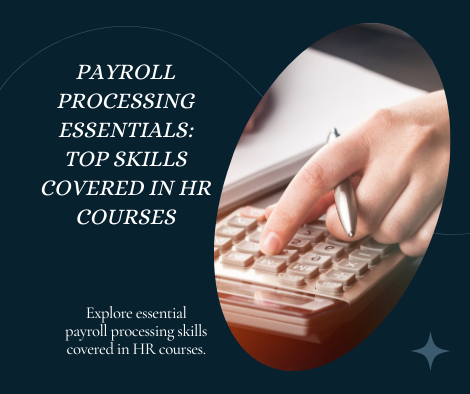Introduction: Payroll processing is a critical function within Human Resources (HR) management, encompassing the calculation and distribution of employee compensation. To excel in this role, HR professionals need to possess a diverse set of skills that enable them to navigate complex payroll systems, ensure accuracy, and maintain compliance with relevant regulations. In HR courses focused on payroll processing, several key skills are covered to equip professionals with the knowledge and expertise required to effectively manage payroll operations. Let’s explore some of these essential skills in detail:
- Understanding Payroll Regulations: A fundamental skill covered in HR courses is the comprehension of payroll regulations and laws governing compensation, taxes, and deductions. HR professionals need to stay updated on federal, state, and local regulations to ensure compliance and mitigate legal risks associated with payroll processing.
- Proficiency in Payroll Software: HR courses often provide training in popular payroll software applications used in the industry. Proficiency in payroll software enables professionals to efficiently process payroll, generate reports, and maintain accurate records. Hands-on experience with software functionalities prepares individuals to handle diverse payroll tasks effectively.
- Calculation of Gross and Net Pay: An essential skill in payroll processing is the ability to accurately calculate gross and net pay for employees. HR courses cover various factors influencing pay calculations, including wages, overtime, bonuses, deductions, and taxes. Understanding these calculations ensures precision in payroll processing and prevents errors that could affect employee compensation.
- Tax Withholding and Reporting: HR professionals must possess knowledge of tax withholding requirements and reporting obligations associated with payroll processing. Courses cover topics such as federal and state income tax withholding, Social Security and Medicare taxes, and the preparation of tax forms such as W-2 and 1099. Competence in tax compliance is crucial for avoiding penalties and maintaining regulatory compliance.
- Benefit Deductions and Contributions: Managing employee benefits is an integral part of payroll processing. HR courses provide insights into benefit deductions, including health insurance premiums, retirement contributions, and other voluntary deductions. Understanding benefit calculations and contributions ensures accurate payroll deductions and facilitates seamless administration of employee benefits.
- Payroll Auditing and Reconciliation: Auditing payroll records and reconciling discrepancies are vital skills taught in HR courses. Professionals learn to conduct periodic audits to verify the accuracy of payroll transactions, identify discrepancies, and rectify errors promptly. Payroll auditing helps maintain data integrity and ensures compliance with internal controls and auditing standards.
- Compliance with Wage and Hour Laws: HR courses emphasize compliance with wage and hour laws to prevent violations and potential lawsuits. Professionals learn about regulations governing minimum wage, overtime pay, record-keeping requirements, and classification of employees as exempt or non-exempt. Adhering to wage and hour laws is essential for fostering fair labor practices and avoiding legal liabilities.
Conclusion: Payroll processing is a multifaceted function that requires HR professionals to possess a diverse skill set encompassing regulatory compliance, software proficiency, accurate calculations, and auditing capabilities. HR courses play a crucial role in equipping individuals with the essential skills needed to excel in payroll management roles. By mastering these skills, HR professionals can ensure efficient payroll processing, mitigate compliance risks, and contribute to the overall success of the organization.
“Unleash your HR potential at Next Innovation Asia, Chennai’s leading HR Training Institute. Acquire certified training, essential skills, and career support. Begin your path to a fulfilling HR profession today!”

